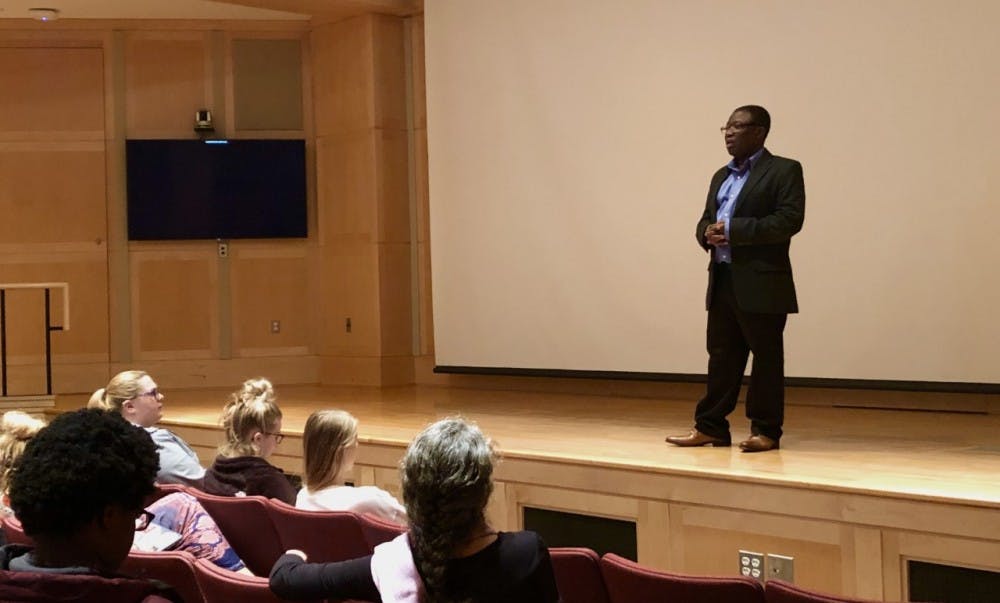CMU professor discusses witchcraft in Ghana

Mensah Adinkrah, CMU Professor of sociology and criminal justice, speaks about witchcraft on Oct. 21 in the Charles V. Park Library Sarah and Daniel Opperman Auditorium.
On the dark and stormy night of Oct. 21, a week before Halloween falls on Central Michigan University, students filled the Charles V. Park Library's Sarah and Daniel Opperman Auditorium to discuss cultural competency, mystical religions and witchcraft.
The department of philosophy and religion and the department of sociology, anthropology, and social work invited Mensah Adinkrah, a sociology and criminal justice faculty member, for their third annual Anthropology of Religion Speaker Series.
The evening began with opening remarks from philosophy and religion professor Laurel Zwissler who organized the lecture in collaboration with anthropology professor Laura Cochrane.
"Beyond just entertaining stories and getting to learn about people who are different than you there's a real advantage to learning about cultural differences that can benefit you in all sorts of fields or interests," Zwissler said.
Adinkrah was born in Ghana, growing up specifically around Akan witchcraft beliefs. After obtaining a bachelor's degree in sociology from the University of Ghana in 1980, he came to North America to pursue two master's degrees and eventually a Ph.D. from Washington University.
When he returned to Ghana most of his family and friends welcomed him back with open arms, except for a few aunts and uncles who attributed his intellectual accomplishments to his mother using witchcraft.
In 2005, Adinkrah wrote "Witchcraft, Witches, and Violence in Ghana" in which he analyzes witchcraft as a feature of many contemporary African societies.
Adinkrah drew a distinction between bayi pa (good witchcraft) and the wicked nature western cultures identify with witches. He also spoke on specific features of witchcraft, the term's dedication to gender.
While westernized cultures often pair witchcraft with medieval Europe or colonial Salem, the belief in spells, secret societies, and bewitchment still exists in many contemporary societies.
In Ghana, witchcraft is often used as a scapegoat to denote illnesses, marital issues, and financial hardships, he said. A false accusation of witchcraft could mean disdain from one's family and community.
At the end of his presentation, Adinkrah allowed the audience to raise questions and comments.
"I thought this was fascinating," Ovid Senior Katelin Lentz said. "Religion is so integral in understanding people's behaviors and actions. If you understand the belief, you understand the motivation. It gets rid of the 'us vs. them.'"
Although he jokingly denounced his belief in witchcraft with the crowd, Adinkrah said he still will keep warding charms and supplies on his bedside table to ward off all possibilities of witchcraft.
"I think anything that deals with cross-cultural issues is relevant. It's important that a student knows and understands the cultures and peoples of other parts of the world, even if it's something like witchcraft," Adinkrah said. "The world is becoming an increasingly small place."
The Anthropology of Religion Speaker Series celebrates CMU faculty with interesting research angles into cultural competency and comparative politics. To learn more about the speaker series, contact Laurel Zwissler at 989-774-3444 or zwiss1l@cmich.edu.






